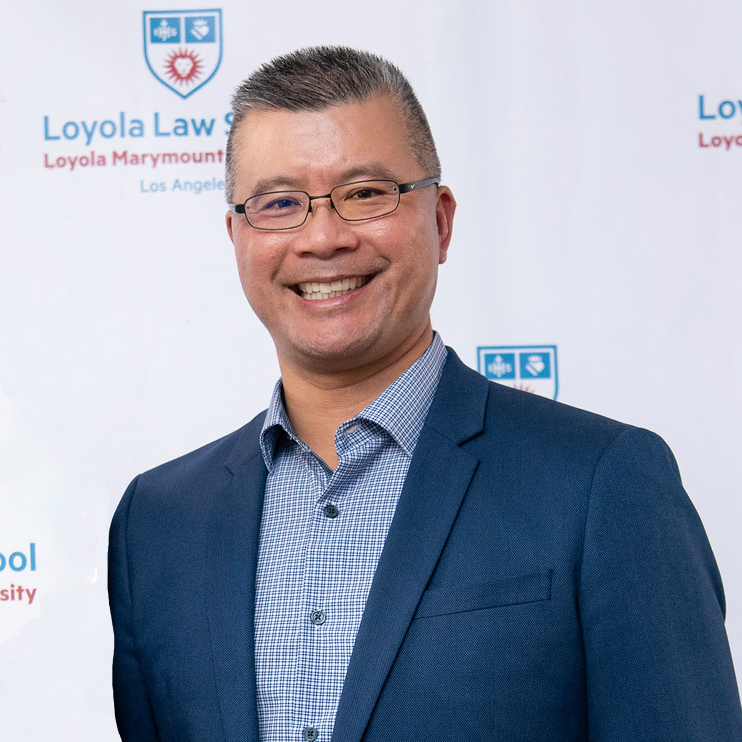Navigating Google: How an LLS Alum Designed His Dream Job

Back in 2002, when Christopher Chin ’94 announced that he was going to go to work in Google’s legal department, his lawyer friends made fun of him. After all, they said, Google is just another search engine and won’t last more than a few years.
It did last, of course, and Chin now is the tech behemoth’s legal director. He also is one of the newest members of LMU Loyola Law School’s Board of Directors.
Chin suspects one reason Dean Michael Waterstone asked him to join the school’s advisory board is because he is different from most of its other members. For one thing, he is based in the Bay Area, not Southern California. He works in-house for a corporation, rather than in a law firm.
And these days, he doesn’t really practice law. Instead, Chin is in charge of developing technology for Google’s 1,200-person legal department. “Basically, we help build tools to manage Google’s legal work,” he said.
One application his legal technology team created responds to subpoenas and requests for information from law enforcement agencies, such as the contents of a criminal suspect’s Gmail account. “We get over 100,000 requests per year to produce, not just email records, but records from the entire Google ecosystem for a single user,” Chin said.
Another important project is building a new e-discovery platform to allow Google. “Imagine how many times we get sued around the world,” he said. “We need an automated way to gather, review and produce terabytes of data for any lawsuit.”
Now, Chin’s team is using artificial intelligence and machine learning to extract metadata from all the company’s commercial contracts. The system will be able, for instance, to tally up all of Google’s contracts with Apple and ensure that all those contracts’ warranty sections are consistent.
“It’s pretty cutting edge, and it’s really interesting,” he said.
Keeping things interesting is important to Chin, a truth he says he learned as a Loyola law student.
“Loyola is where I figured out that hard work means something and that being interested in something is significant because you do a better job when you are into what you’re working on,” he said.
As a first-year student, Chin sought to distinguish himself by writing an article for the Loyola Law Review. To make writing the scholarly piece fun, he chose college sports and antitrust as the topic. His piece, “Illegal Procedures: The NCAA’s Unlawful Restraint of the Student-Athlete,” is still cited.
After graduating and going to work as a bankruptcy judge’s law clerk, he spotted a news article about a top attorney who left a major law firm to join the early Internet browser company Netscape, then just a start-up. As one of the first Loyola law students to own a laptop, Chin thought of himself as fairly tech-savvy.
“I was amazed the lawyers could work for these tech companies.” He decided to go in-house with one himself.
Chin started at Oracle Corp., where he helped negotiate commercial transactions for the large database company. Over the next several years, he did similar work other technology companies, including Netscape.
In 2002, he became the head of Google’s commercial transactions team, which he soon discovered needed new technology itself. To keep track of all the company’s commercial contracts, the team was using a spreadsheet — one so large it took 20 minutes to load.
By 2004, Chin launched a new contract management system for the transactions team. In 2009, he convinced Google’s general counsel that the legal department as a whole needed better technology.
“In ’09 there was not that much of a legal technology industry,” he noted. “Now, it’s quite a booming industry.”
Service on the Loyola Board of Directors is just one way Chin gives back to the school. "The more involved I have become, the more grateful I am for my LLS experience, which is why my family and I chose to establish the Chin Family Scholarship. It is important to us that future generations of Loyola students have the access to same opportunities I have enjoyed.
He continued: “Loyola is where I figured it all out. Because the school did not have a cutthroat environment, it let me get my footing. In the end, it turned out to be the perfect place to light the fire under me."
And the feeling has only grown. “As I get older, I appreciate it even more,” he said.